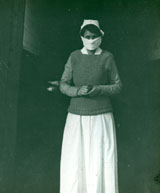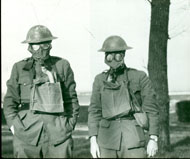In Her Words
Letter from Julia C. Stimson to her family, August 8, 1917
Rev. Henry A. Stimson, father of Base Hospital 21 chief nurse Julia C. Stimson, compiled his daughter’s letters to her family during the First World War into the book, Finding Themselves. Published in 1918 (before the end of the war), Finding Themselves tells of the experiences and gradual changes in the nurses as they “found themselves” through days and nights of unrelenting and difficult service.
In this letter to her family, Julia Stimson describes not only some of the emotional strains she and her nurses felt but also her gas mask training instruction.
August 8, 1917
. . . It is ten days since I have written at all to any one. We have been very busy, and have all had long hours of work and I have not felt much like writing when I have had the time to do so. The pressure has now let up a bit, but I think it will be only a temporary let-up. Our hospital is very full and we have many very bad cases. My nurses are beginning to show the effect of the emotional strain. Their nerves are a bit on edge, and I find that when they lose for a few days time-off duty, as they all have been doing, they are not standing the strain and loss as well as they did the last time we were so busy. I have had about a dozen of them weeping, so I am hunting about for more forms of diversion. The continuous rainy, damp weather, the accumulating emotional strain, and the real hard work are having an effect upon them all that is bothering me. There is a convalescent hospital for Sisters at E., to which I can send one or two at a time for a short rest as soon as I can spare them. But I do not want to have to begin to do that yet. So we are having a little dance in our Mess to-morrow night and perhaps I can get up some bridge parties or some other games. Our sitting-room space is so small we are very much handicapped but if it will only clear up, we could play some outdoor games. You see my real problems are beginning. I would have given a good deal myself to have some one like Mother to weep on, last Sunday. You can imagine how I miss my older women friends. Naturally I cannot do any weeping here, since I have to be wept on; but there are times when it would be such a comfort to be braced myself.
There was nothing really wrong on Sunday, but that day we had so many sick men to look after, and things got a bit complicated and several nurses got hysterical and I felt things were just too much. Any one would have thought so if they had seen our poor gassed men who are so terribly burnt. One of my most stolid nurses came to me that day and said “I just don’t know how I am going to stand it, taking care of so and so.” I said “Why not?” and she replied, “When he was brought in to us he was so badly burned we could hardly see any part of him that we could touch except the back of his neck; but that isn’t the worst part, instead of cursing or moaning he was singing, and I just can’t stand that.” It isn’t only women that are affected by these things, the men don’t weep often, but they come near it. And they get just as edgy and worn to a frazzle. They lose more sleep than the nurses do, for they have to get up in the night all the time, to operate, or attend to patients, or look after convoys, in or out.
I want to tell you about the most unique day I ever had in my life. It was last Monday when I and five other nurses went out for our gas training. All soldiers receive gas training, as you know, and are fitted with gas helmets, which they take with them to the front. . . . There is a regular school here where thousands of soldiers are given their training daily. It takes the greater part of the day. I cannot describe it. You will have to wait till I get home. But we had our masks tested first in a room filled with lachrymating gas; we were drilled in putting them on any number of times, for speed is a very important element, so each motion is counted and timed. We were lectured for an hour, the most interesting and barbarous lecture I every heard in my life. It is at one and the same time the refinement of science and civilization, and of hideous barbarism. We had lunch in a dugout with the officers of the school, for the school is in the middle of a huge plain, and then we were taken into a trench filled with lachrymating gas so that we would know what it is like. This without helmets. Then with three officers, one before, one in the middle, and one behind our string of six nurses, and a medical officer standing outside, we were taken into a closed, tunnel-like affair into which chlorine gas was being poured in clouds from special pipes. We of course had our masks on and were all carefully inspected before we went in. This gas would not hurt us, they say, but we get the smell and get used to wearing the masks and are ready afterwards to get our certificate.
Next letter from Julia Stimson to her family (Oct. 30, 1917)>>
Return to Letters & Memos (In Her Words)
Return to In Her Words
Back to Top


